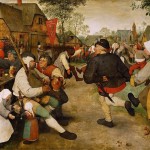Dear Friends and Family,
If you have time, I recommend you watch the video above before reading my post, which will primarily be a response to it.
When I came to faith in Jesus Christ nearly thirteen years ago now, it was through, in part, the ministrations of the Jacksonville Church of Christ. At the time, I knew nothing about the history of the Restoration Movement to which most churches of Christ belong. All I knew was that this church loved Jesus and didn’t use instrumental music in their worship services. I love that church and am thankful to all of its members for helping me grow in my faith. Truly, it was one of the matriarchs of that church who first suggested I be a professor. I say this because I do not want this post to appear as an attack. I am not trying to tell the a cappella Churches of Christ that they must use instruments. All I want to make clear is that the use of instruments in worship to God is not sinful and that the arguments laid out by the video above fall apart.
The video begins its study by citing 2 Timothy 3:16-17 (6 All Scripture is breathed out by God and profitable for teaching, for reproof, for correction, and for training in righteousness, 17 that the man of God may be competent, equipped for every good work.). The gentlemen in the video use this verse to say that the Bible is authoritative and it is how we receive authority from God to do anything (specifically, though they do not mention this, in worship to God). Right here, however, in the point from which the rest of their article hangs, they are in trouble. When Paul wrote this passage, toward the end of his life, the Bible had not yet been finished. Even taking the most conservative dating possible, there would be at least the book of Revelation unwritten at the time Paul is writing. Not only this, but in an age before digital media, or even printing presses, it would have been unlikely that any congregation had all the exact same books of the New Testament we know and recognise today. What they would have had, however, are the Old Testament Scriptures. Paul is almost certainly referring specifically to the Old Testament Scriptures.
This is a problem for the gentlemen in the video because, for them, all the Old Testament Scriptures are under the Old Covenant and therefore have nothing to do with how we worship today. If this is so, however, then why would Paul say that they are so useful?
Paul’s understanding of the Old Testament Scriptures aside, they then go on to cite Eph. 5.19 and Col. 3.16 as saying that only vocal, congregational music is acceptable to God. They note that a version of the Greek verb to pluck is included in Ephesians and deal with it by first suggesting that if it does denote instrumental music then all must play (reading this verse as an explicit command for all in the congregation), but end by saying the instrument to played is one’s heart. The problem I have with this is that a close reading of Eph. 5.19 could suggest that one ought to sing only inwardly. That point aside, both passages require (if it is a requirement) to sing Psalms.
In one of a list of arguments they critique for the use of instrumental music is the fact that Psalm 150 talks about playing music to the Lord. Now, they try to deal with this subtly by suggesting that perhaps David’s playing the harp in worship to God was not acceptable. This point is weak since the text indicates otherwise. Also, since Paul calls Christians to sing Psalms, this would include Psalm 150 (and other Psalms that mention instruments within them). How do they deal with this in the video? They don’t.
While they make various other arguments that I could critique I want to conclude with critiquing their two fundamental presuppositions. 1. Scripture’s silence is prohibitive. Whether they recognise it or not, this notion comes from tradition. It comes from a slogan developed perhaps by Thomas Campbell one of the founders of the Restoration Movement: ‘Where the Scriptures speak, we speak; where the Scriptures are silent, we are silent.’ There are, perhaps, a variety of problems with this slogan. The only one I want to mention is that it is not scriptural. The Scriptures themselves do not require this of us. 2. We can only worship in ways God has authorised. If this is true, where is it in Scripture. I get the feeling that if pressed, they would go to the Old Testament Scriptures. If so, this would lead one to ask why can we take this from the Old Testament Scriptures, and not the use of instruments in worship?
Again, I hope none of my a cappella brothers and sisters in Christ feel attacked by this. All I want to show is that the premises on which this video is based are flawed. Perhaps there is more room for freedom in Christ in our worship than they allow. By all means, continue singing a cappella. It is beautiful for human ears when done well (when done with the right heart it is always beautiful to God). However, please stop condemning other groups within the Restoration Movement and other denominations for their use of instruments to worship God.
Yours,
David











